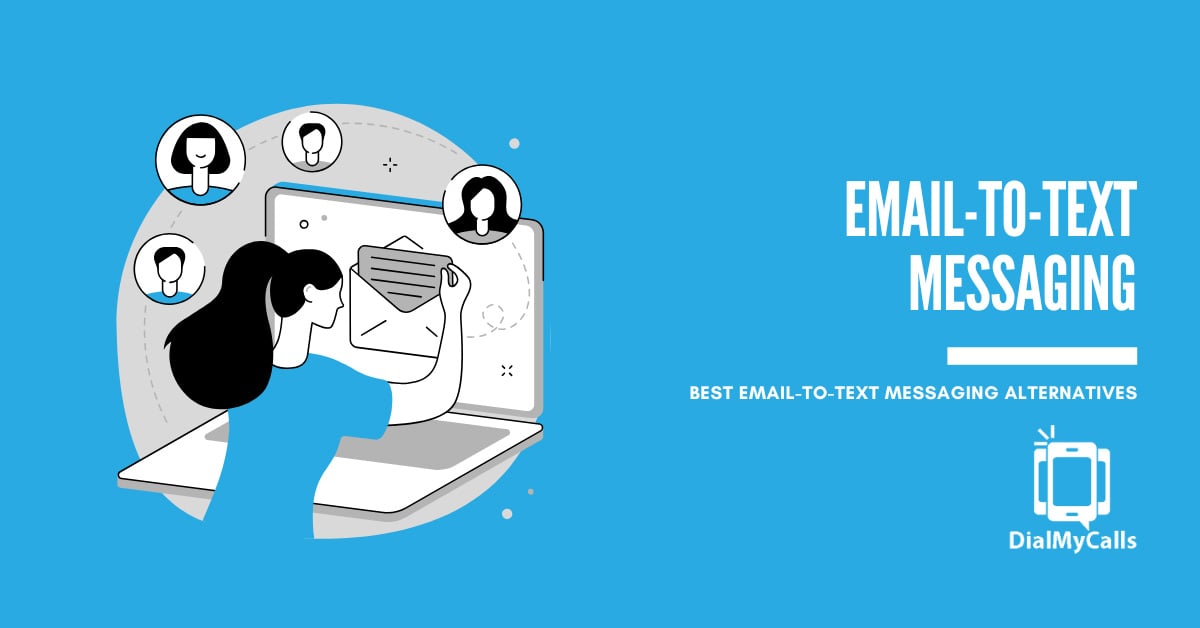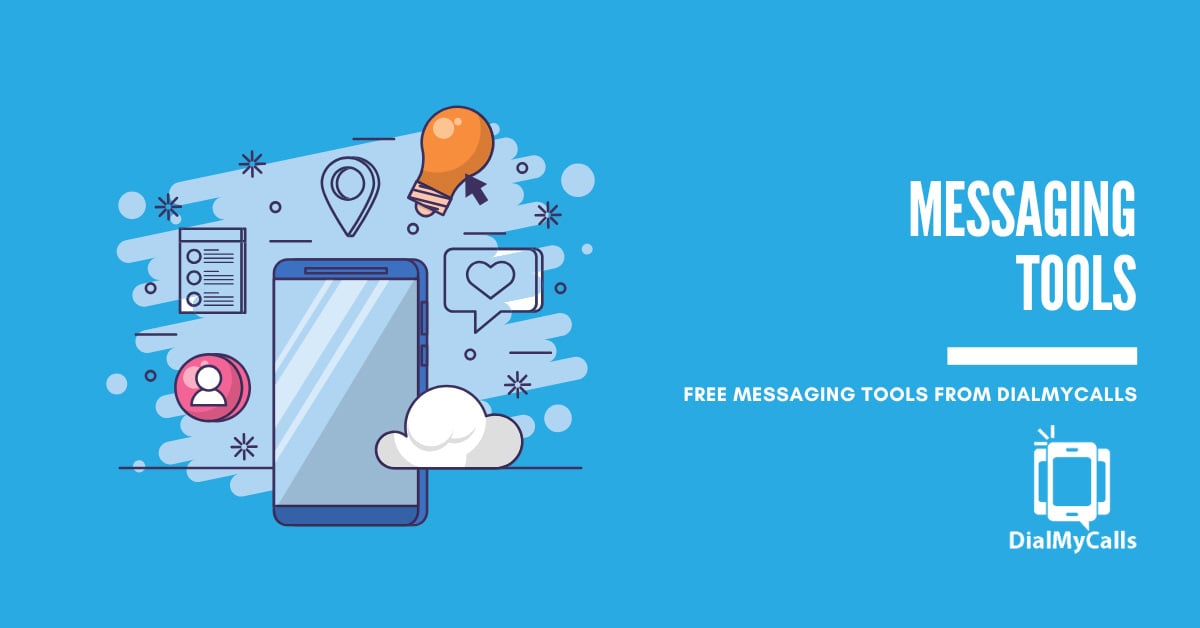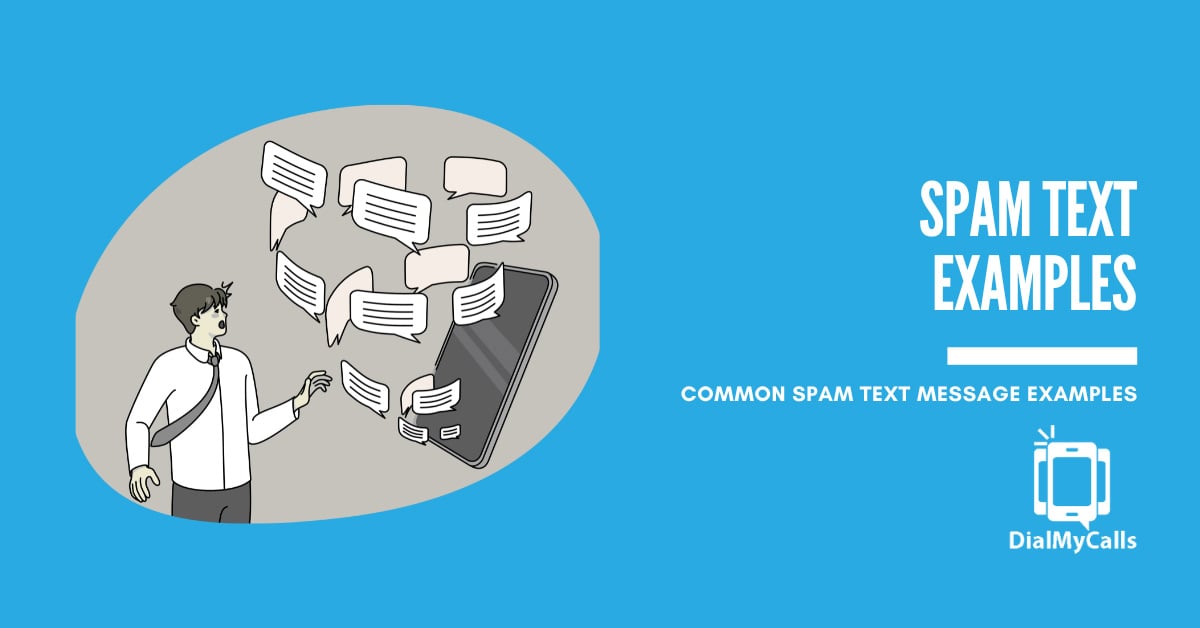Local vs. Toll-Free: Which Number Type Do People Trust More? [Survey Data Inside]
Posted by Saad Z. Asif in General Post on July 16, 2025
Reviewed by Tim Smith | Updated on February 26, 2026
![Local vs. Toll-Free: Which Number Type Do People Trust More? [Survey Data Inside]](https://www.dialmycalls.com/wp-content/uploads/2025/07/local-numbers-vs-toll-free-numbers.jpg)
Have you ever considered what your business phone number says about you? It might seem like a small detail, but the type of number you choose can make a big difference in how customers perceive your brand and whether they decide to answer your call or respond to your message.
Choosing between a local number and a toll-free number is more than just a technical decision. It’s about building trust, boosting engagement, and aligning with your overall business goals. A local number can make you feel like the friendly business next door, while a toll-free number can give your brand a polished, professional edge that signals nationwide credibility.
We conducted a proprietary survey of 1000 U.S. consumers to gain a deeper understanding of their preferences between local and toll-free numbers. The results reveal key insights into how number types impact trust, engagement, and response rates. Let’s take a look at which type of numbers people respond best to.
Psychological and Behavioral Cues Tied to Phone Numbers
People naturally react to phone numbers based on how they look and feel. If a number is easy to recognize or understand, it feels more trustworthy. We also tend to trust numbers that seem familiar or local. Some numbers give off a sense of professionalism or authority, which can make a business seem more credible. The right number can also make people feel more secure, especially if it fits the situation or place they’re in.
Finally, people often feel more comfortable with local numbers compared to toll-free ones, which can seem more corporate. Choosing the right type of number can make a big difference in how customers respond.
Cognitive Fluency
People are more likely to engage with what feels easy to process. Numbers that look “familiar” (like local formats) are cognitively easier to trust.
Familiarity Bias
People instinctively trust what feels familiar. A local area code often signals community, relevance, and a “neighborly” presence—leading to a higher likelihood of picking up.
Authority Signaling
Toll-free numbers convey scale and professionalism. They often trigger associations with established businesses, especially in industries like finance, tech, or healthcare.
Security & Legitimacy Perception
For sensitive industries (banks, insurance, healthcare), toll-free numbers often convey officiality and compliance. Local numbers in these contexts may feel unverified unless well-branded.
Contextual Relevance
Consumers judge a number not just by format, but by the context in which they receive it. A toll-free number used for transactional texts (e.g., delivery updates) feels functional and expected. A local number used for billing issues may feel more personal and intrusive.
Emotional & Behavioral Comparison: Local vs. Toll-Free Numbers
| Psychological Cue | Local Number | Toll-Free Number |
|---|---|---|
| Initial Emotional Response | Familiar, relatable, often tied to community | Professional, established, associated with national presence |
| Trust Signal | High in local service contexts or known area codes | High in industries like finance, healthcare, or customer support |
| Spam Association (Perception) | Lower—perceived as more personal | Higher if unsolicited, but expected from recognized brands |
| Communication Expectation | Assumes texting and easy call-back | Assumes structured support or transactional communication |
| Use Case Fit | Ideal for local outreach, service industries | Ideal for centralized support, nationwide brands, or customer helplines |
| Caller ID Behavior | Often verified, area-recognized | May vary; best used with branded caller ID or registry verification |

Survey Snapshot: Who We Asked & What It Reveals
- 1000 U.S. adults via a Survey
- Demographics: Male & Female, 18-55+ (United States)
- Mix of questions: answering habits, spam perception, call-back preferences, SMS reactions
- Emphasize survey neutrality and data integrity.
Key Takeaways for Businesses from this Insightful Survey
Do People Answer Local or Toll-Free Numbers More Often?
Survey Result: Local wins (72%)
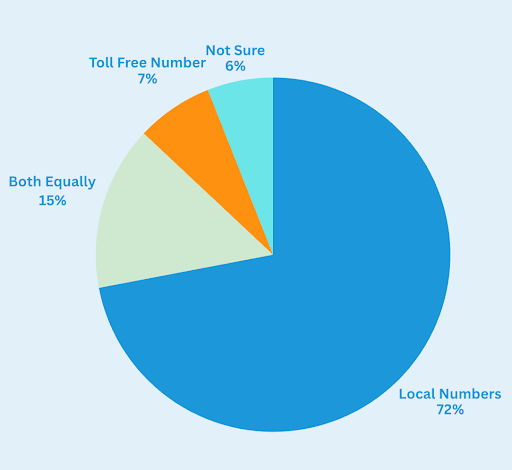
Real-world experiences often reflect what the data shows. One such example comes from Matt Bowman, Founder of Thrive Local:
“I had a client in Phoenix who was struggling with cold calls using their 800 number. Pickup rates were terrible. We switched them to local Phoenix numbers for their campaigns, and within two weeks, their answer rates doubled. Same script, same team, just a different number showing up.”
Build Trust with Every Message - Use a Local Number
Boost engagement and response rates with a local number your audience recognizes.
Which Number Screams Spam?
Survey result: Toll-free flagged more often
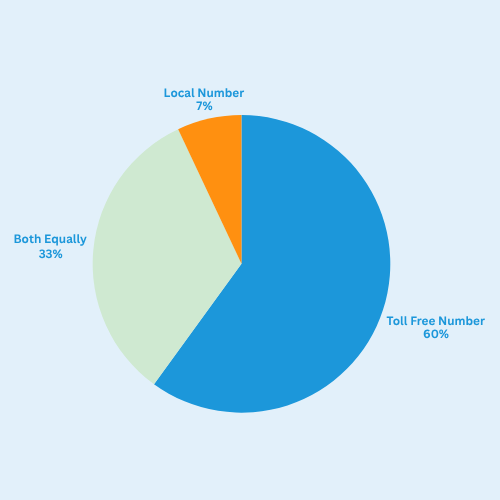
This perception is echoed by industry leaders who’ve seen it firsthand. As Arsen Misakyan, CEO and Founder of LAXcar, explains:
“Customers tend to equate 1-800 numbers with spam when they receive a random call. This is probably because tons of telemarketers and robocalls use toll-free numbers, of which you are not always sure if they are legitimate.”
Callback Trust: Which Numbers Get Returned?
Survey stat: 63% prefer returning local numbers
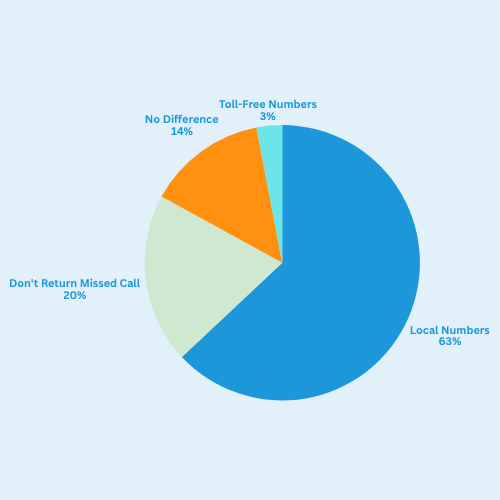
Local numbers don’t just increase pickup rates—they also boost callbacks. Samir ElKamouny, Founder & CEO of Fetch & Funnel, shares how this plays out in their client campaigns:
“For missed call returns, our conversion optimization testing shows local numbers consistently outperform by 15-30%. We’ve implemented this strategy for our Web3 and eCommerce clients with great success – people return calls to what feels like a real person rather than a faceless entity.”
Build Trust with Every Message - Use a Local Number
Boost engagement and response rates with a local number your audience recognizes.
Text Messaging: Local vs. Toll-Free Preferences
Stat: Local numbers preferred for texts
The preference for local numbers extends beyond calls to text messaging as well. Ryan T. Murphy, Sales Operations Manager at Upfront Operations, highlights the impact of lead-nurturing campaigns:
“Text messaging data from my clients shows overwhelming preference for local numbers. When implementing a text communication strategy for a client’s lead nurturing program, messages from local numbers saw 71% higher engagement rates than identical messages from toll-free numbers, likely because consumers have been conditioned to associate toll-free texts with automated marketing messages rather than personalized communication.”
Which Type of Number Feels More “Personal” or “Human”?
Stat: 90% of the survey takers say local numbers feel more personal
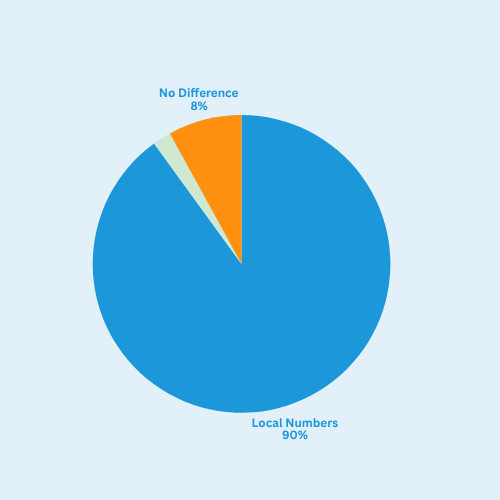
Trust plays a crucial role in call engagement, and data continues to support the local-first approach. Bernadette King, CEO of King Digital Pros, shares how this insight shapes their client strategy:
“Our lead tracking software shows people overwhelmingly trust local numbers. When analyzing missed call behavior for our Albuquerque clients, we found customers were 3x more likely to call back a local number versus toll-free. This directly impacts conversion rates, which is why we emphasize local presence in our map listing optimization.”
Key Takeaways: When to Use Local vs. Toll-Free Numbers
Businesses Where Local Numbers are Ideal
| Business Type | Why It Works |
|---|---|
| Local Service Providers | Builds trust through geographic proximity (e.g., HVAC, salons, electricians). |
| Real Estate Agents & Brokers | Area code recognition makes outreach feel personal and relevant. |
| Medical Clinics & Local Healthcare | Patients feel safer when contacted by someone in their own community. |
| Restaurants & Small Retailers | Easier for customers to call/text for orders or inquiries. |
| Community-based Professionals | Lawyers, tutors, and consultants benefit from perceived accessibility. |
Businesses Where Toll-free Numbers are Ideal
| Business Type | Why It Works |
|---|---|
| National Brands and Enterprises | Creates a centralized point of contact across multiple regions. |
| Customer Support Centers | Reduces cost for inbound callers and signals professionalism. |
| Finance, Insurance & Legal Firms | Often perceived as official and compliant. |
| eCommerce & Logistics Companies | Useful for transactional updates, returns, and 24/7 assistance. |
| Healthcare Networks | Patients expect a toll-free number for insurance or centralized services. |
While local numbers often win in consumer outreach, the context can shift dramatically in B2B and specialized industries. Tony Crisp, CEO & Co-Founder of CRISPx, offers nuanced insights from working with leading tech and healthcare brands:
“In B2B scenarios, business decision-makers are more likely to answer unfamiliar numbers during work hours, making timing more important than the number type. For high-end products like Robosen’s Buzz Lightyear, toll-free numbers enhanced trust and reinforced the premium brand image. Similarly, in medical campaigns like SOM Aesthetics, combining toll-free numbers with HIPAA-compliant messaging improved patient confidence, suggesting that professionalism and perceived security can sometimes outweigh local familiarity.”
Conclusion: The Right Number Can Make a Real Difference
Your number is part of your brand. It does not just connect a call, it reinforces trust.
Local numbers build trust in your neighborhood. Toll-free numbers extend your reach and elevate your brand. But this isn’t about which one is better, it’s about fit and function. The right number type depends on who you’re trying to reach, what you’re offering, and how your audience expects to interact with you. Using both strategically can help you scale smart and serve better.
Still unsure? Visit DialMyCalls to explore your options or speak with our team about creating the perfect communication strategy, whether it’s local, toll-free, or a powerful combination of both.
Build Trust with Every Message - Use a Local Number
Boost engagement and response rates with a local number your audience recognizes.
Author

Saad Z. Asif is a telecom executive and author with over 27 years of global experience in 3G, 4G, 5G, and IoT innovation. He has held leadership roles at Verizon, T-Mobile, Telenor, and VEON, and advised governments on award-winning telecom policies. Saad is the founder of Galaxy Technology Consulting LLC and author of three books on telecommunications.
Try Using DialMyCalls Right Now
Start For Free
Recent Posts
- Why Uptime Matters: Ensuring Redundancy and Failover in Emergency Communication Systems
- 9 Smart Ways Local Governments Use Mass Texting for Public Safety & Crowd Control
- How to Send Emergency Alerts During Network Outages or Low Connectivity
- What Is NG9-1-1? How Next-Generation 911 Will Transform Emergency
- How to Use Fire Emergency Alerts to Improve Safety Response
Categories
“I am a youth minister and have spent hours in the past calling students individually to remind them of an upcoming event or to get out an urgent announcement. With DialMyCalls.com, I cut that time down to about 1 minute. I also love how I can see exactly who answered live and how long they listened so I know if they heard the whole message. DialMyCalls.com is the best website I have stumbled upon all year! Thanks!”
Central Baptist Church
Try Using DialMyCalls Right Now
Start For Free
Author

Saad Z. Asif is a telecom executive and author with over 27 years of global experience in 3G, 4G, 5G, and IoT innovation. He has held leadership roles at Verizon, T-Mobile, Telenor, and VEON, and advised governments on award-winning telecom policies. Saad is the founder of Galaxy Technology Consulting LLC and author of three books on telecommunications.
Try Using DialMyCalls Right Now
Start For Free
Recent Posts
- Why Uptime Matters: Ensuring Redundancy and Failover in Emergency Communication Systems
- 9 Smart Ways Local Governments Use Mass Texting for Public Safety & Crowd Control
- How to Send Emergency Alerts During Network Outages or Low Connectivity
- What Is NG9-1-1? How Next-Generation 911 Will Transform Emergency
- How to Use Fire Emergency Alerts to Improve Safety Response
Categories
“I am a youth minister and have spent hours in the past calling students individually to remind them of an upcoming event or to get out an urgent announcement. With DialMyCalls.com, I cut that time down to about 1 minute. I also love how I can see exactly who answered live and how long they listened so I know if they heard the whole message. DialMyCalls.com is the best website I have stumbled upon all year! Thanks!”
Central Baptist Church
Try Using DialMyCalls Right Now
Start For Free
